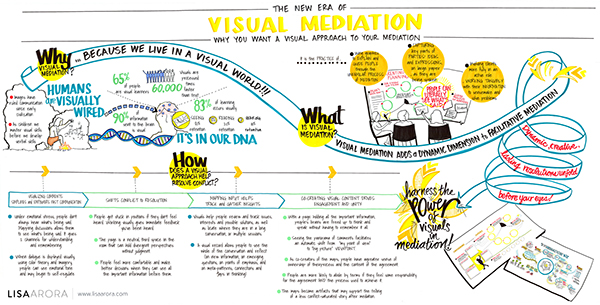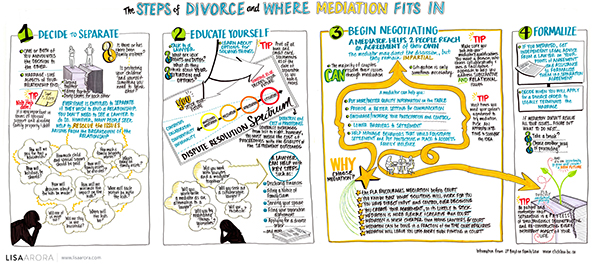What is visual mediation?
 Visual Mediation is the practice of capturing your ideas and expressions––in text, images, and colours on large sheets of paper––as they’re being spoken, in the moment, during mediation. It can also involve the use of visual templates and other visual tools to guide conversations and explain information about the mediation process.
Visual Mediation is the practice of capturing your ideas and expressions––in text, images, and colours on large sheets of paper––as they’re being spoken, in the moment, during mediation. It can also involve the use of visual templates and other visual tools to guide conversations and explain information about the mediation process.
This adds a useful and dynamic dimension to facilitative mediation. It supports effective communication, ensures shared understanding and involves both parties more fully in playing an active role.
I blend visual communication techniques, like graphics, with insightful mediation skills to provide a unique and effective service. Learn more about visual mediation.
Who is visual mediation NOT for?
If you are concerned about violence, don’t feel safe around your spouse, or can’t advocate for yourself, then mediation may not be the best option for you. I’m always happy to discuss your situation with you. If mediation is not appropriate for your situation, there are other processes you can use.
What types of issues do you mediate?
- guardianship
- parenting arrangements including parenting time and parenting responsibilities (detailed parenting plans)
- arrangements respecting contact with a child
- child support
- spousal support
- division of the financial assets and liabilities resulting from the marriage/ partnership; and
- any other issue the parties and the mediator agree to (for example, rebuilding trust, communication etc.)
What is the mediator’s role?
 As a mediator, I’m an impartial third party that facilitates a fair, open, and balanced discussion as you and your spouse solve your issues. I don’t provide legal advice or counselling, and will not make decisions on your behalf.
As a mediator, I’m an impartial third party that facilitates a fair, open, and balanced discussion as you and your spouse solve your issues. I don’t provide legal advice or counselling, and will not make decisions on your behalf.
At various points in the mediation process, I will recommend that you each seek independent legal advice and sometimes other professionals are involved as required.
I help you finally hear each other and understand concerns.
I help you get quality information in the table, I increase your participation and your sense of control, and I lower the barriers to settlement so that YOU can resolve your own dispute.
Will I need a lawyer?
Yes, though it’s up to you and your lawyer to decide how they participate in your mediation. Some people choose to have their lawyer present during the entire mediation. Others seek advice at key points in the process. At minimum, I will recommend that you see a lawyer before mediation to educate yourself on your situation and after mediation for legal advice before formalizing the agreements you’ve made. Lawyers are beginning to offer “unbundled services” which means you can meet with them for specific purposes without having to retain them.
What do I need to do in order to start mediation?
 First, you and the other party must be willing to try mediation.
First, you and the other party must be willing to try mediation.
I’ll meet with each of you separately and during our first meeting, we’ll go over what documents you’ll need to put together, though you can start doing that prior. Depending on your situation, you may need income tax returns, paystubs or other proof of employment, property assessments or appraisals, financial statements, and business financial statements and tax returns. Click here for a Financial Checklist for Separation and Divorce.
I’ll always recommend that both spouses meet independently with lawyers in the early stages of mediation. Even if you don’t think they’ll need to be present at our meetings, it’s important for you to understand responsibilities and entitlements as they relate to your situation.
How much does mediation cost?
Mediation services are billed at $250 per hour plus taxes. Typically, these are shared between parties.
There’s no way to know how many hours it will take to resolve your issues. It could be one or more sessions. Sessions could be 2 hours, 4 hours, or even 6 hours depending upon the scenario. My promise to you is that I’ll always be honest about fees and hours needed. The very good news is that mediation is almost always far cheaper than court.
Read this article to find out how you can lower mediation costs.
Is the agreement legally binding?
When you reach agreements, I will document them in a Memorandum of Understanding. This is NOT a legally binding document. I’ll recommend that you seek independent legal advice on your agreements and file the agreement in court to make it legally binding.
How will my children be involved with the mediation process?
I do not meet with your children, though if their voice needs to be heard, a report can be produced by a specially qualified interviewer.
Have another question not answered on the site?
If your question hasn’t been answered here, please contact me. I will return your message within two business days.



